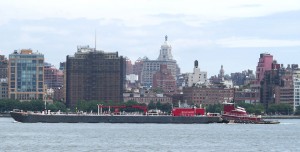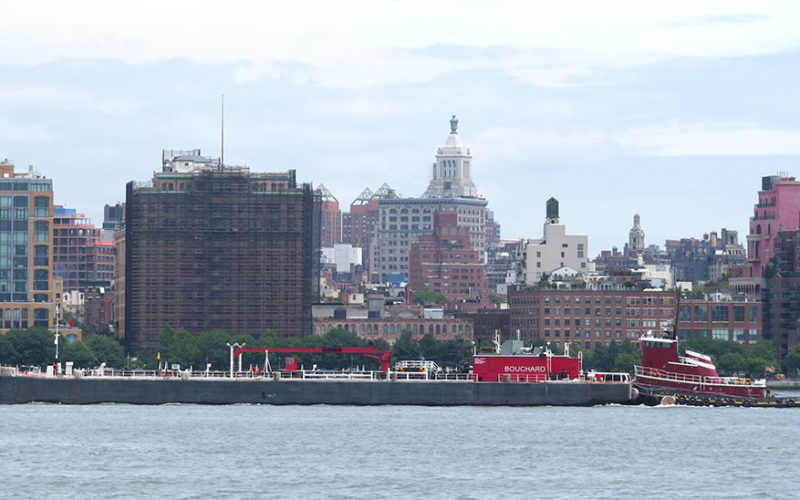
a tank barge up the Hudson River near
Manhattan. In 2016, the U.S. Coast Guard
proposed establishing 10 anchorages for
commercial vessels on the river from Yonkers to Kingston, N.Y., after requests from maritime industry stakeholders.
The controversial issue of tying up oil barges and other commercial vessels along the banks of the Lower Hudson River has been settled by a new federal law.
The National Defense Authorization Act (NDAA), which was enacted on Jan. 1 after Congress overrode President Trump’s veto, includes the ban on tying up. The provision was introduced by U.S. Rep. Sean Patrick Maloney, a Democrat who represents the area and is chairman of the Coast Guard and Maritime Transportation Subcommittee.
The Coast Guard proposed establishing 10 anchorages on the Lower Hudson in a June 2016 notice in the Federal Register. The action followed requests from the Maritime Association of the Port of New York-New Jersey Tug and Barge Committee, the Hudson River Pilots Association and the American Waterways Operators. The anchorages between Yonkers and Kingston, N.Y., would have contained more than 40 berths.
While supported by the towing industry, the proposal generated opposition from residents, local officials and environmental groups.
“This is a major win for the Hudson Valley,” Maloney said after the ban was enacted. “We are the gatekeepers of the Hudson River, and it’s up to us to be good stewards of the river so New Yorkers can enjoy it for generations to come.”
“The Hudson River is safer today because of the legislation,” said Hudson Riverkeeper Paul Gallay. “Communities from Yonkers to Rhinebeck banded together to stop the ill-conceived plan that would have led to new anchorages for oil barges, threatening the progress made restoring the river.”
Ned Sullivan of Scenic Hudson said that “we can stop worrying about floating ‘parking lots’ destroying world-class scenic beauty or resulting in catastrophic spills that could pollute communities’ drinking water, poison wildlife or imperil river-based tourism.”
Towing industry leaders criticized the legislation.
“It is a bit ironic that at a time when the state of New York is trying to promote the Port of Coeymans and the Port of Albany as ports of the future for the state’s green initiative, particularly wind farms, that politicians decide to foray into marine transportation with such an emotional decision,” said Capt. Steven Kress, vice president of operations for McAllister Towing.
“Anchorages for barges are a needed resource in a prudent company’s tool belt to assist the safe movement of barges up and down the Hudson River and to the Port of New York,” he continued. “Whether those barges are carrying wind turbines, petroleum products, steel, household goods or food stuffs, inclement weather, berth delays, heavy traffic or any number of unforeseen occurrences can make a captain decide to minimize the risk by going to anchor. Putting a ban on anchorages takes that valuable resource away.”
The Hudson River Pilots Association did not respond to multiple requests for comment on the ban.
After the Coast Guard proposed the anchorages, New York Gov. Andrew Cuomo signed legislation that gave the state’s Department of Environmental Conservation — in consultation with the Coast Guard, the Board of Commissioners of Pilots, the New York Department of State, the state Office of Parks, Recreation and Historic Preservation, and local elected officials — the authority to determine how vessels carrying petroleum can operate on the Hudson. The bill also allowed the establishment of “tanker avoidance zones” near waterfront communities, critical aquatic habitat and other sensitive areas in and along the river.

